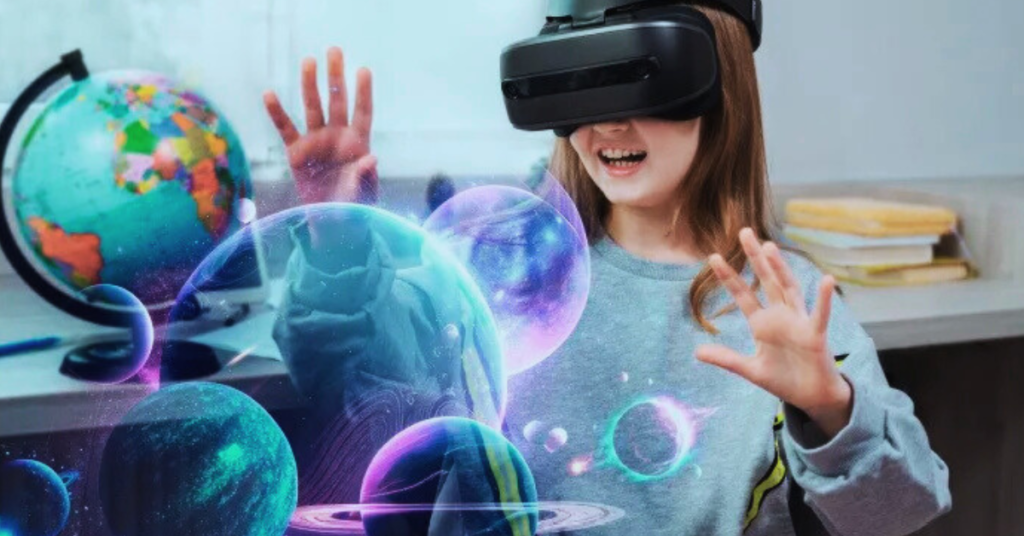In 2025, Augmented Reality (AR) is transforming industries across the board, from education to retail and entertainment. With advancements in technology and increased use of AR devices, this technology is changing how we experience and interact with the world. By blending digital content with the physical world, AR is revolutionizing customer engagement, business operations, and user experiences.
What is Augmented Reality and Why It Matters?
Learn about augmented reality (AR), its benefits, and its transformative impact on industries such as education, retail, and entertainment in 2025.
Augmented reality (AR) is a technology that superimposes digital information—such as images, sounds, or data—onto the real-world environment in real-time. Unlike virtual reality (VR), which immerses users entirely in a digital world, AR enhances our physical surroundings by adding interactive digital elements. This creates a more immersive, engaging experience that fosters deeper interactions and makes everyday tasks easier.
As AR technology gains mainstream adoption, industries are leveraging its potential to transform how people learn, shop, and engage with entertainment. This technology is not just a passing trend but is shaping the future of these industries in profound ways.
Transforming Education with Augmented Reality
Explore how augmented reality (AR) is revolutionizing education in 2025 by offering immersive learning experiences and enhancing educational tools for students and teachers.
AR in education is poised to reshape traditional classrooms by providing students and teachers with interactive and engaging learning tools. The ability to visualize complex concepts in real-time, such as exploring the human body or historical events, brings subjects to life in ways never before possible. In fields like medicine, AR allows students to simulate surgeries and practice techniques without the risks associated with real-life procedures.
Furthermore, AR technology facilitates remote learning, making education more accessible. Virtual classrooms and interactive lessons are bridging the gap between theoretical knowledge and practical application. The integration of AR into education enhances engagement, improves retention, and offers hands-on learning experiences in a digital environment.
Revolutionizing Retail with Augmented Reality
Discover how augmented reality (AR) is revolutionizing retail in 2025 by providing immersive shopping experiences and enhancing customer engagement.
In 2025, AR technology is transforming the retail industry by enhancing the shopping experience, driving e-commerce growth, and engaging consumers in novel ways. With AR apps, shoppers can now virtually try on clothing, shoes, and makeup from the comfort of their homes, reducing the need for in-store visits. This trend has become especially prominent in the fashion and beauty sectors, where consumers can experiment with different outfits or makeup looks using just their smartphones.
In physical stores, AR is being used to create virtual storefronts and immersive in-store displays. Virtual try-ons and interactive product displays allow customers to visualize products before purchasing, leading to higher customer satisfaction and confidence. Retailers are also using AR to deliver personalized recommendations based on a customer’s preferences, location, or browsing history, enhancing the shopping experience.

Transforming Entertainment: The Future of AR in Gaming and Media
See how augmented reality (AR) is transforming the entertainment industry, including gaming, live events, and media, with interactive and immersive experiences.
The entertainment industry has been significantly influenced by AR technology, offering consumers entirely new ways to interact with games and media. In 2025, AR gaming is booming, with players engaging in innovative games that merge the virtual and physical worlds. A prime example of this is location-based AR games, where players explore their environment to complete challenges or interact with virtual characters and objects. Games like Pokémon GO have set the foundation for more interactive and physically engaging gaming experiences.
Moreover, AR in live events and performances is becoming increasingly common. Whether it’s concerts, theater shows, or sports events, AR technology is being used to create dynamic, visually stunning effects that captivate audiences. By blending digital elements with live performances, AR is offering an entirely new level of immersion and entertainment.
The Future of Augmented Reality
Get insights into the future of augmented reality (AR) and its rapid growth across industries in 2025 and beyond, including retail, education, and entertainment.
Looking forward, the potential for AR technology is limitless. As AR devices become more advanced and affordable, the adoption of augmented reality will continue to expand across different sectors. In education, AR will enable more accessible and interactive learning experiences. In retail, AR will create even more personalized shopping experiences, helping businesses stay competitive. In entertainment, AR will blur the lines between the digital and physical worlds, creating immersive experiences that redefine how people consume media and engage with games.
The Transformative Power of Augmented Reality
Understand the transformative impact of augmented reality (AR) in 2025, driving innovation and change in sectors like education, retail, and entertainment.
In conclusion, the rise of augmented reality (AR) is reshaping the landscape of several industries, from enhancing education experiences to revolutionizing retail shopping and transforming the entertainment industry. As AR technology continues to evolve, its influence will only grow, offering new opportunities for businesses and consumers alike. The future of AR holds incredible potential for creating engaging, immersive, and personalized experiences that will continue to transform the way we live, work, and play.
